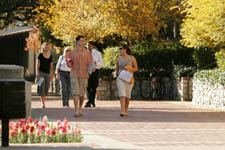 So what's the difference between a champion summer language class and one that simply gets the job done? If you're interested in upping your Arabic language skills this summer at CMC, you'll find out. For seven weeks between May and July, students who've signed up for the College's brand new Intensive Arabic Summer Program will have a language learning experience like no other, says professor of modern languages Bassam Frangieh, who is directing the program.
So what's the difference between a champion summer language class and one that simply gets the job done? If you're interested in upping your Arabic language skills this summer at CMC, you'll find out. For seven weeks between May and July, students who've signed up for the College's brand new Intensive Arabic Summer Program will have a language learning experience like no other, says professor of modern languages Bassam Frangieh, who is directing the program.
The seven-week course, one of the few to be found on any college campus for that matter, is part of the academic lineup for the first ever Summer Session at CMC, happening May 24 through July 9, and open to the students of The Claremont Colleges, as well as other college students and graduates.
What makes the intensive Arabic summer program at CMC a standout is that rather than dip their feet into the course material, students will plunge into an immersive program designed by Frangieh to expose them to the Arabic language and culture 10 hours a day, five days a week. They'll spend the entire day in class together, learning all aspects of the Arabic language, watch documentaries and feature films, and eat meals with one another. On the weekends, they will head out on field trips with their professors to local religious institutions and cultural centers, and to places where they can enjoy Arabic music, dancing, and food, while learning serious Arabic.
On Saturdays, students also will have the option to join in cultural activities, including visits to campus by speakers on the Arabic language and culture, and an Arabic calligraphy workshop teaching students how to use the art to write their names, favorite quotes, verses of poetry, and proverbs.
It's not the kind of academics served up in traditional summer language courses, where students are likely to vacate campus the moment class is over, Frangieh points out. Here, the emphasis is on building a sense of community so that students experience the important connection between the language and the culture, which is vital to learning Arabic successfully, he says. As a residential program, the majority of enrollees will live on campus and spend 200 hours or more of their seven weeks completely engrossed in the language, and in understanding its present and historical relevance, including its value in business and international relations. (As an aside, Wikipedia notes that modern standard Arabic is "widely taught in schools, universities, and used in workplaces, government and the media." It is spoken by more than 300 million people in the Arab world.)
"In America, this is a time when you must study Arabic," Frangieh says. Particularly if you're in international relations, finance, or the foreign services, just having Arabic studies on your CV or resume gives someone the upper hand in world affairs. "You can't go far without studying Arabic, whether you're in economics or government or owner of a private company, or overseas or in the States," Frangieh adds.
Here's something else that distinguishes CMC's Arabic summer program: For the first week of classes, and for about an hour at the end of their day, students will be able to ask Frangieh questions about the idiosyncrasies of the language in Englishwhich is often a no-no in other summer language courses that forbid speaking anything but the subject at hand.
Be forewarned, however, that this isn't a program for slackers by any means. Throughout the day, no matter their level of Arabic speech, students will be only taught in Arabic by their instructors, he says, and the full spectrum of Arabic skills will be covered: speaking, reading, writing, and listening comprehension, and an understanding of Arabic phonology, morphology, and syntax. And in this experience, Frangieh notes, the weeks are more like dog years. Why? Because seven weeks of intensive, immersive studies at CMC, he says, will be equal to a year of Arabic studies elsewhere.
"It's quite amazing," says Associate Dean of the Faculty, Lisa Cody, "but numerous studies on the acquisition of foreign languages show that the very best outcomes result from these sorts of intensive immersion programs on college campuses. Students acquire larger vocabularies, greater progress towards fluency, and certainly confidence in these programs compared even to the experience of typical American college students in study abroad programs."
That means when they exit this introductory program, "students can move on to any second-year Arabic program at any college or university in the nation or overseas," Frangieh says.
Lastly, don't let the name of the program fool you, he says. Although the summer intensive was designed for first-years, Frangieh says students at any level are encouraged to apply. "We can accommodate even the more advanced students by hiring additional teachers to instruct them," he says.
Dean Cody adds: "Bassam Frangieh's energy is infectious and completely inspiring because he wants to enable all students to push themselves as much as possible. This will be a very special opportunity for those students who do not know a word of Arabic as well as those who have Arabic skills that they want to expand. Given the very large Arabic speaking population here in Los Angeles, Professor Frangieh will also be able to bring in faculty who focus on any Arabic dialect a student needs. This is going to be a very special program."
Speaking the Language: CMC Launches Intensive Arabic Summer Program as Part Of Summer Session Options
